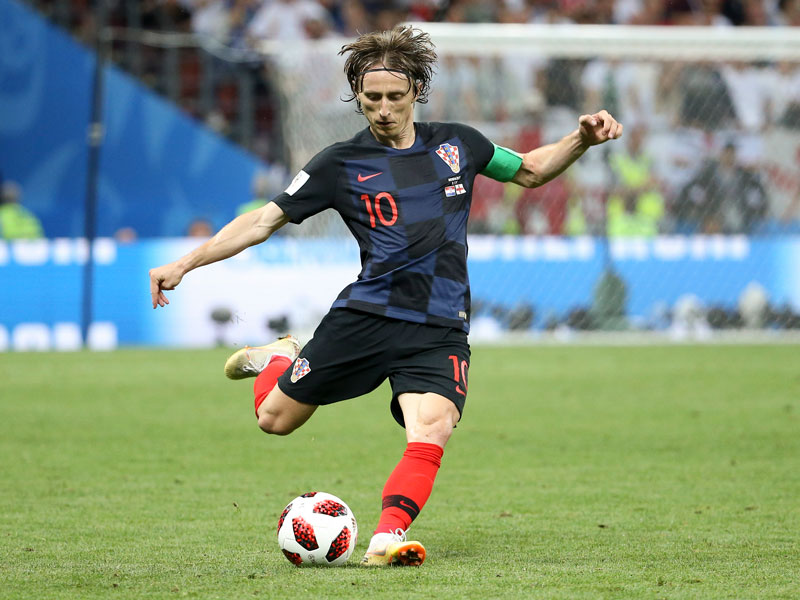Luka Modric – World Player Of The Year
The cover of World Soccer’s March 2017 issue featured Luka Modric with the line “The World’s Best Midfielder?” The Croatian’s performances for European Champions Real Madrid had been
crucial to his club’s success, but the media spotlight had all too often fallen upon his more headline-hungry team-mates, notably Cristiano Ronaldo.
The question mark is no longer needed. Not only has Modric been the world’s best midfielder over the past 12 months, his elevation to the status of best player on the planet is now complete. His role in helping Madrid to a fourth Champions League in five seasons would have been enough to make him a contender for the World Player of the Year award, alongside the likes of perennial winners Ronaldo and Lionel Messi. But it was in helping raise Croatia to the status of World Cup runners-up that saw him overtake the Portuguese and Argentinian, both of whom failed to live up to expectations on the world’s biggest stage last summer.
The Croatia team of 1998, which lost to France in the World Cup semi-finals in Paris, arguably contained more natural talent in the shape of Zvonimir Boban, Robert Prosinecki, Davor Suker, Robert Jarni et al. But that memorable side has been surpassed by the class of 2018, orchestrated and directed by Modric.
As Spain, Germany, Argentina and Brazil fell by the wayside in Russia, Modric was the man who lifted his team to a higher level. His talents, both creative and physical, allowed his team-mates to flourish. With long pinpoint passes as well as sharp, competitive challenges, his full range of qualities was on display.
It is rare for a player to star for both club and country in the same season but only a few weeks after he had celebrated winning the Champions League with Real Madrid in Kiev, Modric was named the best player of the World Cup. He still regrets the French victory in the Final and says: “The second goal [Antoine Griezmann’s penalty ] was a turning point. We were surprised it was given because of the free-kick the referee gave for the first goal which wasn’t a free-kick in my opinion.
“We recovered after the first goal and when we played our best football he gave a penalty and it kills you.
“I think we were unlucky to lose. We played well and I think we were the better team but sometimes better teams don’t win. We have to be proud with how we played but it wasn’t enough to win it.”
Croatia are the latest in a long line of east European countries who have been raised from the pack by an extraordinary individual: Bulgaria with Hristo Stoichkov, Gheorghe Hagi’s Romania, the Ukraine of Andriy Shevchenko.
Modric is Croatia’s greatest-ever player and arguably the best to have emerged from the region of the former Yugoslavia, yet his modesty is disarming.
When questioned about the house he had built in his adopted hometown of Zadar, he replied: “People ask me why it’s only a mini villa. They want to know why it’s so small. There’s only four of us [wife Vanja, son Ivano and daughter Ema]. What are we supposed to do with the five or six rooms we don’t use?”
Zadar, on Croatia’s Adriatic coast, is where the Modric clan – Luka, father Stipe, mother Radojka and younger sister Jasmina – sought refuge during the Yugoslav civil war in the early 1990s. They had been forced to flee their home on the slopes on the Velebit mountains in northern Dalmatia following the murder by Serb paramilitaries of Luka’s grandfather.
Luka was only six at the time and the family were housed in one of the largest hotels in the town, the Kolovare. But there was little respite from the war, as Zadar came under constant Serb bombardment by both land and sea. It was while kicking a ball along the corridors of the hotel that the youngster came to the attention of local club NK Zadar.
Training sessions often came under fire from mortar attacks but Zadar nurtured the young Modric, despite his diminutive frame and lack of stature.
A major setback came in the form of rejection by Hajduk Split when aged 12. But the head of the Zadar youth academy, Tomislav Basic, encouraged him to keep the faith, working with him to improve his fragile physique.
“Without him, I wouldn’t be where I am now,” Modric says of Basic, who died in 2014.
Croatia’s leading club Dinamo Zagreb signed him at the age of 16 and two years later, in the summer of 2003, he headed for Bosnian club Zrinjski Mostar on loan, a move that proved to be his making.
He learnt how to be a midfield all-rounder in Bosnia and was voted the league’s best player, aged just 18. After another loan spell, at Croat first-division side Inter Zapresic, he was ready for Dinamo, where his performances would attract attention from Europe’s elite clubs. In the end, Tottenham Hotspur beat a host of European heavyweights, including Barcelona, to his signature, signing
him for £16.5million in 2008.
The transfer to England from Zagreb would later come back to haunt Modric when he was charged in 2018 with perjury for providing false testimony in the trial of Zdravko Mamic, the all-powerful former Dinamo executive who had allegedly siphoned off money from deals involving a number of Croatia internationals, including Modric and fellow international Dejan Lovren, who was also charged.
Charges against Modric were dropped in October, but not before the case had damaged his reputation back home. Now in his seventh season with Madrid, Modric has a contract until 2020, when he will turn 35.
A rumoured contract extension, reportedly promised after he rejected a post World Cup move to Internazionale, has not yet materialised.
For the moment, however, Luka Modric has more than enough to celebrate.






